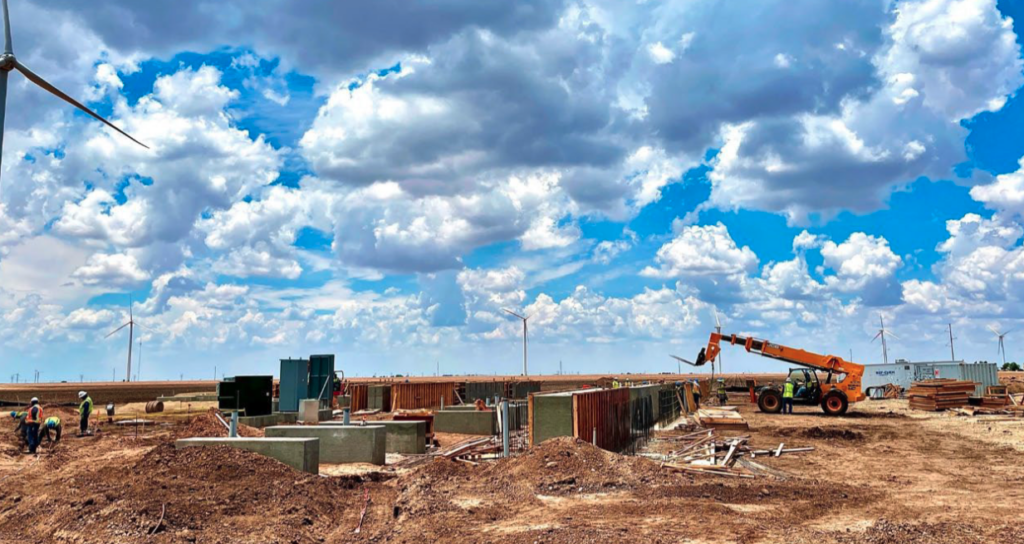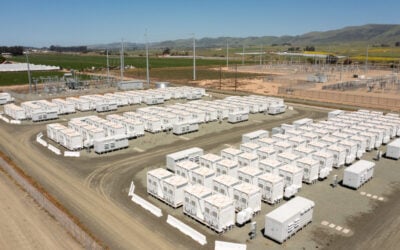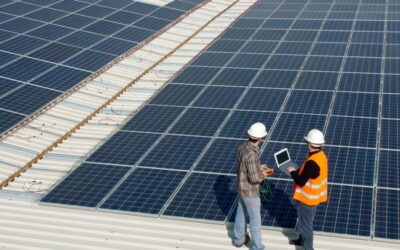
Energy company Enel Green Power has completed a wind-plus-storage facility while RWE just installed all inverters on one of its own, both in Texas.
Enel Green Power has completed the Azure Sky wind-plus-storage plant in Texas’ Throckmorton County, which combines 350MW of wind power and a 136.5MW/204.6MWh battery energy storage system (BESS). It is the company’s first large-scale hybrid wind project globally, it said.
Enjoy 12 months of exclusive analysis
- Regular insight and analysis of the industry’s biggest developments
- In-depth interviews with the industry’s leading figures
- Annual digital subscription to the PV Tech Power journal
- Discounts on Solar Media’s portfolio of events, in-person and virtual
One of the offtakers of power from the Azure Sky plant is breakfast cereal company Kellogg, which will purchase 360GWh of its expected 1,300GWh annual generation, Energy-Storage.news reported in March 2021 as construction began.
The Italy-headquartered company will also add 57MW/85.7MWh of BESS to its largest operating projects in Texas, the Roadrunner solar PV farm and the High Lonesome wind facility. The BESS units mentioned here are all one-and-a-half-hour systems.
It said the projects will strengthen the Texas power grid during periods of peak energy demand with clean generation and dispatchable storage resources.
The company is also building three entirely new wind-plus-storage units in the state on which construction began a couple of months after Azure Sky. There is also a ‘companion’ solar-plus-storage project, Azure Sky solar-plus-storage, which Enel Green Power is developing in Haskell County, which includes 284MW of solar PV and 95MW of battery storage.
Meanwhile, Germany-based global energy company RWE has completed the installation of all inverters on the site of its Texas Waves II, a 30MW/30MWh BESS project which is adjoining the existing Pydon Wind Farm. The project is expected to come online by the end of 2022, and will be the company’s largest AC-coupled battery in the Americas.
RWE said the project will provide ancillary services to the ERCOT (Electric Reliability Council of Texas) grid as well as participate in the energy market through load shifting. The proportion of revenues for BESS projects is roughly split evenly between the two.
It is also part of a series of moves by the company to add storage to wind assets, although RWE has already done this at RWE Pyron and Inadale wind farms in the Lone Star State in 2018 (with 9.9MW BESS units at each).
Long-time readers of Energy-Storage.news may recall also that Texas Waves was the name of one of the first grid-scale BESS projects in the ERCOT service area, commissioned in 2018 by fellow European energy company E.On before a huge asset swap deal with RWE.
Co-location of energy storage and renewable generation has to-date mostly focused on pairing with solar PV rather than wind. This is because wind projects are have a large minimum size meaning a bigger battery is required. Wind power is also much more intermittent than solar, meaning potentially much more cycling of the battery and faster degradation, whereas solar generation is predictably tied to a daily generation profile.
The latter has led flow battery companies to argue that their technology is better placed than lithium-ion to provide this firming for wind. However, most installations of this type to date including RWE and Enel Green Power’s latest endeavours, use the more common lithium-ion technology set.






